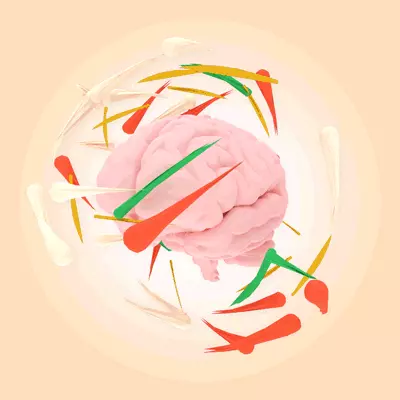It is the factor from childhood that determines how your brain will function when you grow old
There is no doubt that one of the most frightening things about aging is a decline in cognitive function.
Now a new study from the University of Haifa reveals that the environment in which we grew up affects brain function in old age.
Here are all the details
Walla!
health
24/11/2021
Wednesday, 24 November 2021, 14:35
Share on Facebook
Share on WhatsApp
Share on Twitter
Share on Email
Share on general
Comments
Comments
Five things you may not have known about the brain ("Do not miss" system)
Our brain ages with age, and with this aging often comes a decline in cognitive function.
Quite a few studies from recent years are trying to find ways to slow this decline, or at least factors that predict it, and now a new study from the University of Haifa has found a common factor that can do that.
According to the new study, exposure to books in childhood affects the way our brains age.
Yes, book exposure, not necessarily reading.
More on Walla!
3 simple memory tests that can be done on the weekend and in general
To the full article
The study found that the more books libraries contained in childhood, the slower the decline in cognitive function in old age.
"Developing cognitive abilities in childhood can produce 'reserves' that protect the brain from degeneration in old age," said Dr. Galit Weinstein, the study's editor.
She added that "we actually examined the exposure to books and not reading itself. The hypothesis was that the very exposure to a large amount of books in the home could be a stimulus that has a positive effect over time."
8,239 subjects, 27 countries
Cognitive decline is a phenomenon that can occur as we age, and it affects our ability to understand, remember, and function socially.
Acquiring education, activating the brain in various ways such as learning a language and solving crossword puzzles, as well as attending social gatherings are some of the actions that can reduce the risk of cognitive decline with age.
But as mentioned, researchers are looking for more ways to prevent it.
More on Walla!
The surprising and amazing benefit of a bedtime story
Is it already possible at the age of 8 to know what the brain will be like at the age of 70?
8 amazing things you did not know about memory
Heart attack: how to prevent and what to do in case he still appears
In the current study, published in the journal Dementia and Geriatric Cognitive Disorders, Dr. Weinstein from the School of Public Health at the University of Haifa, together with Dr. Ella Kon-Schwartz from the Department of Public Health at Ben-Gurion University and Noam Damari from the Knowledge Center for Population Aging, asked The relationship between the size of libraries that exist in homes and the cognitive functioning of adults over the age of 65 years.
The study was based on data from the Health, Aging and Retirement Survey in Europe (SHARE) and involved 8,239 people aged 65 and over, from 27 countries across Europe, between 2004 and 2013.
Most study participants reported that they had between 11-25 books as children.
Start filling the house with books
The results of the study show that the larger the home library, the better the function of short-term and long-term memory, and the ability of verbal fluency, the better regardless of the level of education or socioeconomic characteristics.
"Our findings show the possible contribution of the home library to the preservation of cognitive health and the slowdown of brain aging decades later," said Dr. Weinstein. Dr. Ella Con-Schwarz added that " To better preserve cognitive function in old age. "
Positive impact decades later.
Tel Aviv Book Week (Photo: Reuven Castro)
According to the researchers, exposure to a large number of books in childhood can increase the cognitive abilities of children who learn to enjoy reading, acquiring education and other cognitive skills, and therefore develop "reserves" that protect them from the process of cerebral degeneration in old age.
It is also possible that children who have been exposed to many books in their home have maintained a healthier lifestyle throughout their lives, which is reflected in a healthy diet, exercise, and avoidance of smoking, and therefore have maintained their cognitive abilities in old age.
"This study adds to the knowledge about the importance of children's environmental conditions to their brain health in old age. Further research is needed to learn about the long-term consequences on the brain of the transition from reading printed books to using digital media in children," Dr. Weinstein concluded.
health
news
Tags
brain
aging
Old age
Alzheimer's
Haifa University














